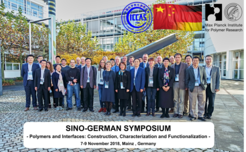Scientific exchange with China strengthened
Sino-German symposium took place at the Max Planck Institute for Polymer Research
Which influence do interfaces have on nanoscopic, polymeric materials? That was the main topic from the 7th to the 9th of November at the Max Planck Institute for Polymer Research (MPI-P) in a sino-german symposium.
In the symposium organized by Dr. Kai Zhang, group leader at the MPI-P, and Prof. Hans-Jürgen Butt as well as by the scientist Prof. Jianjun Wang from the Institute of Chemistry, Chinese Academy of Sciences, current research results in the field of polymer and interface science were presented and discussed. The symposium addressed a variety of challenging questions, as e.g. preparation, characterization or functionalization of polymers and interfaces.

The range of the application fields was thus very broad, ranging from the production of novel materials for organic solar cells over light-formable liquid crystal polymers, liquid- and dirt-repellent surfaces, to biologically active materials as well as novel experimental and theoretical analytic methods.
"For us, the symposium was a great success, not just on the scientific side," says Kai Zhang. "We have also noticeably strengthened the bilateral bridge between the scientists of both countries."
In future, advanced joint projects will continue within the research frame “polymers at interfaces” in order to achieve promising results together.












